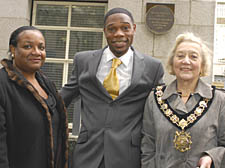| |

Remembering Mary Prince: Labour Diane Abbott MP, Camden’s mayor Councillor Dawn Somper and Jak Buela chief executive of the Nubian Jak Community Trust |
Plaque tribute to ex-slave who shook Victorians with tales of plantation life
Memoirs of ‘unsung hero’ exposed vicious floggings, sex abuse and squalid conditions
A PLAQUE to commemorate the life of a woman whose account of her time as a slave helped mobilise the Abolition movement, has been unveiled by Diane Abbott.
Mary Prince, who lived in a house on the site now occupied by the University of London, created a storm of controversy when her story of life as a black woman toiling in the plantations in Antigua was published in 1831.
Her memoirs were unprecedented and horrified the delicate sensibilities of 19th-century England with vivid recollections of vicious floggings meted out with horsewhips, sexual abuse at the hands of tyrannical masters and squalid conditions where fellow slaves were literally forced to eat their own faeces.
They provided a wake-up call to politicians who had previously dismissed the plight of slaves as distant and unimportant.
Ms Abbott, the MP for Hackney North and Stoke Newington, paid tribute to Mary Prince’s “capacity for survival” and “spirit of endurance”.
She said: “It’s important to remember in this bicentenary year of the abolition of the trans-Atlantic slave trade that it wasn’t just MPs and white activists like William Wilberforce who campaigned for an end to the abhorrent practice.
“It was ordinary people and former slaves like Mary, the unsung heroes, who don’t get acknowledged.
“Slaves were not just helpless victims or objects of the kindness of strangers, they struggled for their freedom, whether it was through uprising in Haiti, rebelling on slave ships or through writing like Mary Prince. Since the dawn of time there has been a history of black women having to endure and I am especially pleased to recognise and celebrate this.”
Mary Prince was born the daughter of slaves in Bermuda around 1788.
At the age of 10 she was sold to a slave-holder for £20. As well as working in her master’s kitchen, she also worked in chain-gangs in the tobacco fields, doing back-breaking work under the merciless Caribbean sun.
In 1818 she was sold on to a plantation owner in Antigua, where she met and married a former slave who had bought his freedom.
She was brought to England as a servant with her new owner but plucked up the courage to flee and ended up finding sanctuary with Thomas Pringle, a political activist and secretary to the Anti-Slavery Society.
With his encouragement, Mrs Prince was able to publish her book The History of Mary Prince: A West Indian Slave.
It was the first life of a black woman to be published in Britain and its colourful testament of ill treatment and survival provoked two libel actions and ran into three editions in the first year of publication.
The plaque is displayed on the corner of Senate House in Malet Street. It was organised by Camden Council and the Nubian Jak Community Trust. |
 |
| |
|
|


